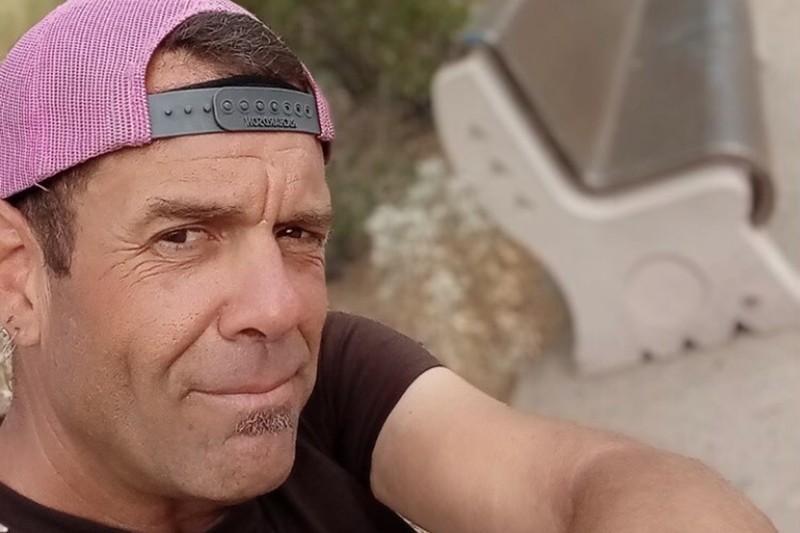It leads to a cell in the Arizona State Prison Complex in Phoenix where Beekman — in the throes of a psychotic episode, splashed or, depending on which account you believe, spat — lukewarm sink water on a correctional officer on August 3. For this, Beekman was shot with multiple rounds of pepper balls as he cowered underneath a mattress in his cell.
Despite Beekman's history of severe mental illness, prosecutors are charging him with aggravated assault. A conviction would keep Beekman, 49, in prison for years.
According to Montgomery, it is a tragedy that her son ended up in Arizona's prison system at all.
On January 9, a federal judge issued a sweeping preliminary order in Jensen v. Shinn — a yearslong class-action lawsuit over continued health care failures in Arizona prisons. The landmark decision by U.S. District Court Judge Roslyn Silver determined that care in the prisons was "often abysmal" and that the state's Department of Corrections had resisted court-ordered reforms and required "substantial" court intervention.
While the case inches closer to bringing the prison system under greater oversight, proceedings against Beekman are moving forward.
Beekman was in his early 20s when he was first diagnosed with schizophrenia. At the time, the recent culinary school graduate was living in western Massachusetts. He worked as a cook at an upscale $1,000-a-night resort tucked away in the Berkshires and had a close circle of friends. But at some point, things began to shift.
"He would say to us, 'You don't understand how depressed I am,'" Montgomery said in a recent interview.
Beekman lost his car, his job, and his housing as he began to have delusional episodes. Montgomery tried to get him help, so when she moved to Arizona, he came with her. But the diagnosis marked a stark new chapter of their lives — one of rotating psychiatrists, an unending search for a treatment center with available beds, and times when Beekman would forget who he was.
A History of Mental Illness
Montgomery lives in the suburbs of Scottsdale in a home with big windows and a shady backyard. When she spoke to Phoenix New Times, she flipped through the reams of her son's paperwork as she recounted the details of his story — evidence that she's been trying to get him long-term help for so many years. Sometimes, Beekman would stay with his mother and his stepdad, Jim. The last time Montgomery saw her son, she recalled, he showed up unannounced on their back patio. "Mom, don't worry about me. I'm a survivor," she remembers him telling her.Beekman's first interaction with the criminal justice system was in 2019 at a Starbucks in Phoenix when police responded to a call about trespassing. When officers searched Beekman, they found a small baggie of methamphetamine in a box of cigarettes.
A series of petty, nonviolent drug violations in 2020 and 2021 followed Beekman's first arrest. Each time he was stopped on the streets by Phoenix police, he readily admitted to occasionally using meth. Once, he ran from officers into a busy street and was hit by a car.
For a time, his documented mental illness — recognized as a serious mental illness by the state's health care system — kept him from prison. But that changed in the summer of 2022 after Beekman lost contact with his probation officer. On June 3, he texted his mother that he had been living outside near a horse ranch in the McDowell Mountains, listing all the animals he had seen there: javelinas, coyotes, woodpeckers, a bald eagle. He was happy, he said.
Weeks later, he was picked up on a probation violation on one of his past drug charges. In another two weeks, without his family's knowledge, he signed a plea deal for a two-and-a-half-year prison sentence.
Montgomery doesn't believe her son understood the deal he was taking. After the hearing, Montgomery remembered he called her from jail, thrilled, explaining that he was about to be released and wouldn't have a probation officer anymore — a stipulation of the plea deal. When she learned from Beekman's former public defender that he was going to prison instead, "I thought I was going to fall on the floor," she said.
Then, she stopped receiving calls from her son.

An incident involving Bruce Beekman at the Arizona State Prison Complex in Phoenix last August could keep him incarcerated for years.
Katya Schwenk
The ‘Assault’
Documents from the Department of Corrections obtained by New Times detail Beekman's time in prison. Due to his health, Beekman was given the highest score possible for mental health issues in the prison system — 5M — and placed in the Ida Ward at the state prison in Phoenix. The ward is a unit for incarcerated men with serious mental health needs.On August 3, 2022, Beekman was distressed. He hadn't received his medication after two weeks in prison. He had no contact with his family. He was alone.
Security footage of Beekman in his cell that day, as described in a report by prison investigator James Currier, showed him repeatedly filling his food tray with water, pouring it on the floor, and then wiping the floor with his hand. At one point, he took a drink of the water and walked to the front of the cell. He filled the tray again. Then, he suddenly flung the water at the door of his cell. "His body movements suggest he is yelling at the cell front door while holding on to the tray in his left hand," Currier wrote.
Stanley Wilford, a prison guard who was outside Beekman's cell, noticed liquid splash onto his upper left side. Wilford believed that Beekman spat at him or threw other bodily fluids. Wilford told investigators that he wanted to press assault charges.
"[Wilford] went on to say the only reason he wants to [press charges] is that no one ever followed up with him and at the time he didn't know it was water, believing it was a bodily fluid," Currier wrote, adding that Wilford had been assaulted at work in the past.
Wilford declined to comment on the case when reached by phone by New Times.
That day, within minutes of the incident, other officers responded, according to reports obtained by New Times, and attempted to speak with Beekman. Distressed, Beekman tried to barricade himself inside his cell with a mattress.
The guards quickly turned violent.
While Beekman tried to hide behind his mattress, the guards deployed "a 1-2 second burst of chemical agents," according to one guard's report. "Inmate Beekman began attempting to cover himself with his blanket at the back of his cell," the guard wrote. The officers brought in a PepperBall launcher, a weapon that fires pepper spray projectiles.
"[The] inmate continued to refuse directives, the inmate began to hide under his bed, and approximately nine rounds of PepperBall were deployed under the bed in an attempt to get him to comply with directives," the officer continued. After nine rounds were fired, guards were able to restrain Beekman.
They took him to a medical evaluation, then tried to interview him. When Beekman refused to speak, the officers simply returned him to his cell, according to reports by multiple guards.
In response to a list of detailed questions about the case, including whether the guards' actions that day complied with Department of Corrections policy, the agency said it was "prohibited by HIPAA from discussing an individual person's private and confidential medical information."

Maricopa County Attorney Rachel Mitchell said Bruce Beekman engaged "in behavior that could jeopardize somebody else."
Katya Schwenk
Prosecutors Defend Charges
The Maricopa County Attorney's Office maintains that Beekman is being prosecuted because he spat at Wilford. Currier's report concluded that surveillance footage seems to show Beekman spitting out of the cell after taking a drink from the sink before flinging water with the tray.But in an interview with Wilford, the investigator casts doubt on this version of events. "I told [Wilford] Beekman had taken a drink from the sink, but this was before he grabbed the tray and flung it towards the cell door. I told him the footage shows what Beekman threw was the water from the tap and used to fill the food tray," Currier wrote. It was "clear it was not bodily fluids that [were] thrown," he added.
Ultimately, Beekman was charged with aggravated assault on a correctional officer and not with aggravated assault with bodily fluids, as the guard requested.
Regardless, Beekman was clearly unwell at the time. When Currier went to visit him for an interview about the incident, he found Beekman distressed in a cell in the mental health ward.
"He was lying in a fetal position on his right side near the cell door. I knocked on the door, and he quickly jerked up. I called out his name and told him I wanted to talk to him. Beekman rapidly became agitated, yelling and screaming at me that he was not Beekman but another name," Currier wrote. "This concluded my attempted contact with Beekman as it was apparent he was engaged in some form of a psychotic episode."
Beekman was so unstable at the time that prison staff refused to allow him to meet with the new attorney his family hired to help challenge his older case.
"I continuously requested legal calls with the client, and in-person legal visits. However, I was advised that no calls or visits would be scheduled because Mr. Beekman 'had not been stabilized,'" Michael Denea, Beekman's attorney, wrote in a court pleading.
Yet while prison staff asserted that Beekman was too unstable to talk to his lawyer, they pushed him through a series of disciplinary hearings and found him guilty of assault. Prison policy dictates that such hearings should not be conducted if the incarcerated person can't understand the proceedings.
The prison then handed the case over to the Maricopa County Attorney's Office, which indicted Beekman for aggravated assault. The felony charge could carry a yearslong sentence given Beekman's prior convictions.
Yet Maricopa County Attorney Rachel Mitchell said the charges were appropriate in Beekman's case, although the office was taking his mental health into consideration. The office has a history of overcharging alleged assailants for the assault of law enforcement officers.
"The information that we have is that the individual did engage in behavior that could jeopardize somebody else. So we have to respond to that," Mitchell told New Times on January 11. "Not having all the resources that you would like to for people who have mental health issues doesn't mean that we should completely ignore behavior that people engage in."
A hearing about Beekman's mental health is set for March. After the August incident, Beekman was moved to a Maricopa County jail.

Bruce Beekman and his mother, Debra Montgomery, while he was working at a Safeway floral department.
Debra Montgomery
Advocates Condemn Beekman Prosecution
How could a man recognized as seriously mentally ill, with no history of violence, housed in a mental health ward, be pepperballed and prosecuted for splashing water on a prison guard?Corene Kendrick, deputy director of the American Civil Liberties Union's National Prison Project, believes Beekman's case highlights the serious issues with health care in Arizona's prisons. She has worked on the ongoing Jensen v. Shinn lawsuit.
“That’s what can happen when you don’t give people with serious mental illness their medication. These sorts of things can happen, and then they cascade and are self-reinforcing,” Kendrick said. “If [the prison’s] response to the fact that he’s mentally unstable is to further isolate him from his family and others, it just makes the problem worse.”
It was “absurd” that prosecutors were pursuing charges in the case, Kendrick added. “You’d think that they’d have slightly more important things to work on."
Pablo Stewart, a clinical and forensic psychiatrist, testified in the Jensen case that understaffing and other issues cause incarcerated people to "suffer needlessly — often resulting in permanent psychological trauma and suffering, physical disfigurement due to profound acts of self-harm and self-injurious behavior, and in the most tragic of outcomes, death by suicide."
Donna Hamm, executive director of Middle Ground Prison Reform, has submitted a declaration in Beekman’s case opposing his prosecution. “It’s a waste of resources, it’s a miscarriage of justice, it’s a manifest injustice to prosecute this man given the circumstances of this particular case,” she said.
Yet cases such as Beekman's continue in Arizona's prisons. Hamm said a receiver should take control of the state's prison system to force fixes to its healthcare that years of court oversight has failed to accomplish. Silver, the judge overseeing the Jensen case, could appoint a receiver.
"It horrifies me to think this is what has happened to him — and he has a private attorney," Montgomery said of her son. Beekman has what many people lost in Arizona's prison system do not: a family with enough resources to advocate for him, to hire a lawyer, and to call activist groups.
"I think about that all the time," Montgomery said.













